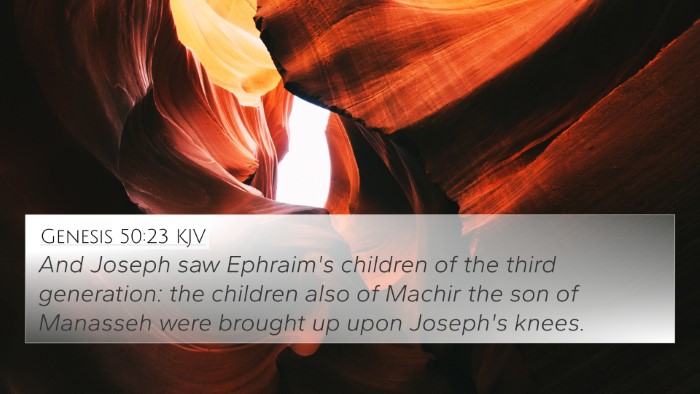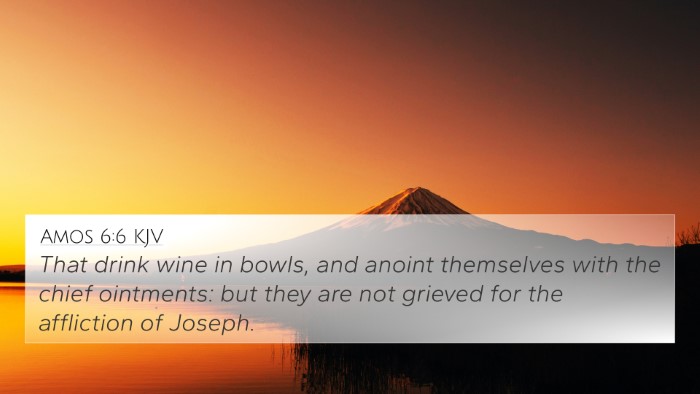Understanding Genesis 41:52
Genesis 41:52 states: "And the name of the second called he Ephraim: For God hath caused me to be fruitful in the land of my affliction." This verse encapsulates the essence of God's providence and blessing even in difficult circumstances.
Verse Meaning Summary
This verse describes Joseph's naming of his second son, Ephraim, which signifies fruitfulness amidst adversity. Joseph reflects on his life, appreciating how God has helped him thrive despite his challenges, particularly during his time in Egypt.
Commentary Insights
- Matthew Henry's Commentary: Henry emphasizes the idea of God's favor and the irony of Joseph's circumstances. Despite being sold into slavery and experiencing hardship, Joseph recognizes that God has provided him with blessings. Naming his son Ephraim serves as a reminder of God's grace even in trials.
- Albert Barnes' Notes: Barnes highlights the significance of the name Ephraim, which means "twice fruitful." He suggests that this signifies not only Joseph's personal success but also the larger narrative of his family flourishing despite previous suffering. The emphasis is on understanding God's role in our lives, particularly during times of distress.
- Adam Clarke's Commentary: Clarke notes that the name Ephraim represents thanksgiving and acknowledgment of God’s providence. Clarke also suggests that Joseph’s experience foreshadows the blessings that would come to his family, linking this to a broader theme of redemption found throughout the Bible.
Key Themes from Genesis 41:52
Several important themes emerge from this verse:
- God's Providence: The recognition of God's intervention in our personal trials is central to Joseph's declaration.
- Fruitfulness in Adversity: Joseph exemplifies how God can bring forth abundance in the midst of hardship.
- Thankfulness: The act of naming his son serves as a testament to Joseph's gratitude for God's blessings.
Bible Cross-References
Genesis 41:52 connects with several key scripture passages:
- Genesis 30:22-24: The birth of Joseph’s first son, Manasseh, signifies God’s action in forgetting his past suffering.
- Isaiah 54:1: The theme of barrenness turning into fruitfulness resonates with Joseph's proclamation about Ephraim.
- Psalm 107:35: This verse illustrates God’s ability to make the desert a place of abundance.
- Luke 1:53: Reflects on God's nature of filling the hungry with good things, linking back to God's provision.
- Romans 8:28: A reiteration of God's sovereignty in working all things for good resonates through Joseph’s experiences.
- Philippians 4:11-13: Paul expresses contentment in all circumstances, akin to Joseph’s journey of recognizing God's provision.
- 2 Corinthians 9:8: God’s grace abounding in our lives demonstrates the theme of fruitfulness Bishop Joseph experienced.
Exploring Thematic Connections
Genesis 41:52 serves as a focal point for thematic connections throughout Scripture:
- God's Sovereignty in Suffering: Similarities can be drawn from the lives of Job and Paul, where suffering led to greater insight into God's character.
- Fruitfulness in Difficult Times: The connection to the New Testament is seen in Jesus’s teachings on bearing fruit (John 15:5).
- Redemption and Restoration: The overarching narrative of Scripture—from Genesis to Revelation—reveals a consistent theme of redemption in the face of human suffering and the promise of fruitfulness.
Conclusion
Genesis 41:52 not only narrates a significant personal moment in Joseph's life but also serves as an illustration of the benevolent providence of God. The cross-references to other Scripture can enhance our understanding of this verse, revealing how interconnected the biblical narrative is and showcasing how God works in the lives of those who trust Him.













